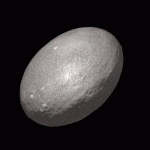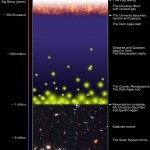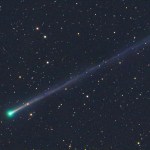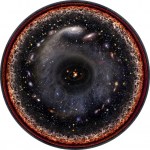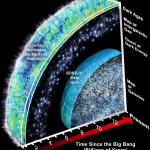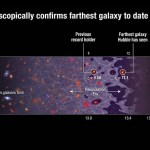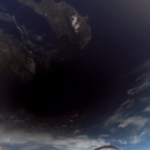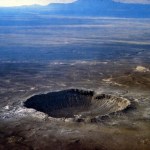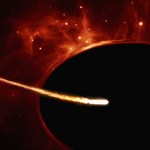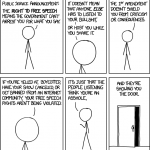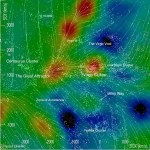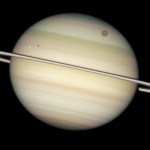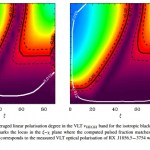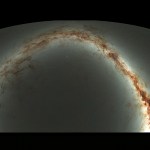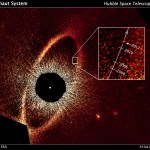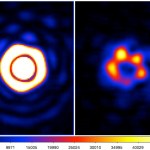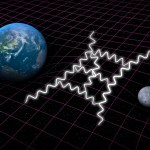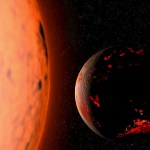
"I've heard it said that God made all men, but Samuel Colt made all men equal. We'd see what Mr. Colt could do for a woman." ― Cherie Priest
Bullets are incredibly dangerous when fired from a gun, but that's true even when they're fired up in the air, not at a target directly. Falling, stray bullets can still reach very large speeds, large enough to break the skin and cause internal damage, potentially even killing someone.
A 0.50 caliber bullet wound of the face. The patient was injured while heating a 0.50 caliber incendiary machine gun bullet with a blowtorch in a World War II-era…
"'I'll follow him to the ends of the earth,' she sobbed. Yes, darling. But the earth doesn't have any ends." -Tom Robbins
We have some pretty good definitions of what it takes to be a planet, and one part of that definition is that a world needs to be massive enough to pull itself into hydrostatic equilibrium. In the absence of external forces and rotation, that means it will be a perfect sphere.
The line for a planet vs. a non-planet is mass-dependent, and making a thin, rigid body fails on that account. You can have a flat "thing" in space, but it wouldn't be a planet if you did. Image…
"The problem is, you’re trying to find these really faint things, but you’re looking behind these really bright things. The brightest galaxies in the universe are in clusters, and those cluster galaxies are blocking the background galaxies we’re trying to observe." -Rachael Livermore
One of the biggest puzzles in science is exactly how the Universe became transparent to visible light. Neutral atoms -- cosmic dust -- blocks visible light, and yet before there were stars, that’s all we had. According to theory, it should be large numbers of small, faint, ultra-distant galaxies that made it…
“We have finally established the contours that define the supercluster of galaxies we can call home … This is not unlike finding out for the first time that your hometown is actually part of much larger country that borders other nations.” -Brent Tully
It's been another remarkable week here at Starts With A Bang! Full of science, stories and a slew of information you won't find anywhere else, we've hit on a number of fantastic ones for your perusal. The news you haven't heard? My upcoming book, on the real-life science behind the technologies envisioned by Star Trek, now has a…
“I want to stand as close to the edge as I can without going over. Out on the edge you see all the kinds of things you can’t see from the center.” -Kurt Vonnegut
We all know how explosions work: a tremendous release of energy causes a rapid outward expansion, and the most energetic particles get flung the farthest and at the greatest speeds. Things fly apart, spread out, and wind up a tremendous distance away. And within our Universe, nothing has ever released more energy than the event that started it all: the Big Bang.
An explosion in space would have the outermost material move away the…
"To know that we know what we know, and to know that we do not know what we do not know, that is true knowledge." -Nicolaus Copernicus
As we peel back the layers of information deeper and deeper into the Universe’s history, we uncover progressively more knowledge about how everything we know today came to be. The discovery of distant galaxies and their redshifts led to expanding Universe, which led to the Big Bang and the discovery of very early phases like the cosmic microwave background and big bang nucleosynthesis.
The history of the Universe, as far back as we can see using a variety of…
"For the first time we can learn about individual stars from near the beginning of time. There are surely many more out there." -Neil Gehrels
We’ve come incredibly far in our quest to learn how the Universe came to be the way it is today. We can see out in space for tens of billions of light years, to galaxies as they were when the Universe was only a few percent of its present age. We can see how galaxies evolve, merge and the stars inside change. And we can see to even before that, when no stars or galaxies existed at all.
The farthest galaxy known to date, which was confirmed by Hubble,…
"To morrow, I believe, is to be an eclipse of the sun, and I think it perfectly meet and proper that the sun in the heavens, and the glory of the Republic should both go into obscurity and darkness together." -Benjamin F. Wade
The Moon is spherical, and so its shadow should be a circle by simple geometry, right? Only, if we view it when it strikes Earth, it’s not even close to a circle. It’s stretched into an ellipse, and further complicated by irregular, sharp edges and corners. Why would it appear that way? As it turns out, three factors combine to get us there.
An illustration of the Sun-…
"By preventing dangerous asteroid strikes, we can save millions of people, or even our entire species. And, as human beings, we can take responsibility for preserving this amazing evolutionary experiment of which we and all life on Earth are a part." -Rusty Schweickart
Asteroid strikes are among the most destructive natural disasters to ever impact planet Earth. While an extinction-level event, like the one that wiped out the dinosaurs some 65 million years ago, are exceedingly rare, we face city-killer impacts somewhere on Earth's surface every few hundred years.
Meteor (Barringer) crater,…
"Put two ships in the open sea, without wind or tide, and, at last, they will come together. Throw two planets into space, and they will fall one on the other. Place two enemies in the midst of a crowd, and they will inevitably meet; it is a fatality, a question of time; that is all." -Jules Verne
When any object passes too close to the event horizon of a black hole, the tidal forces acting on it can become so strong that they’ll tear the entire object apart in a spaghettification disaster. While most of the matter will get ejected from the encounter, a significant fraction can be accreted,…
"Sometimes I even now feel like a stranger in my country. But I knew there would be problems because I had seen the world... Freedom is good, but it is not easy." -Katarina Witt
Yes, as always, as another week goes by at Starts With A Bang! there have been a huge number of great stories we've covered. In addition, we've now recorded sixteen Starts With A Bang Podcast episodes thanks to your Patreon support, and if you're local to the Pacific Northwest, we have some fun events coming up, including a public talk at 7:30 at OMSI on February 20th on the controversy over the…
"For the first time, astronomers have outlined and named the network of galaxies that includes the Milky Way, adding a line to our cosmic address and further defining our place in the universe." -Douglas Quenqua
There’s been a longstanding puzzle in astrophysics that’s finally coming to a head. For nearly a century, we’ve known that our Universe is expanding, and that the distance to a galaxy determines its average apparent recessional speed from us. But on top of that is an additional motion -- a peculiar velocity -- caused by the local gravitational field of the Universe.
A two-dimensional…
“The dance between darkness and light will always remain — the stars and the moon will always need the darkness to be seen, the darkness will just not be worth having without the moon and the stars.” -C. JoyBell C.
What do you do when you discover a moon around Saturn that's only visible during half of its orbit? If you're Giovanni Cassini, you postulate that half of the moon is darker than the other, and you work tirelessly to improve the telescope so that you can see it when it's in "faint mode." After more than 3 decades, he succeeded.
The ringed planet, Saturn, contains a number of…
"What we observe is not nature itself, but nature exposed to our method of questioning." -Werner Heisenberg
Empty space, according to quantum mechanics, isn’t exactly empty. Take away all the matter, radiation and anything else you can have populating your space, and you’ll still have some amount of energy in there: the zero-point energy of the Universe. One consequence of quantum electrodynamics is that this sea of virtual particles is always present, and a strong magnetic field can lead to some really bizarre behavior.
VLT image of the area around the very faint neutron star RX J1856.5-…
“If you can’t measure something, you can’t understand it. If you can’t understand it, you can’t control it. If you can’t control it, you can’t improve it.” -H. James Harrington
If you want to observe the night sky, it’s not quite as simple as pointing your telescope and collecting photons. You have to calibrate your data, otherwise your interpretation of what you’re looking at could be skewed by gas, dust, the atmosphere or other intervening factors that you’ve failed to consider. Without a proper calibration, you don’t know how reliable what you’re looking at is.
Pan-STARRS1 Observatory…
"If your experiment needs statistics, you ought to have done a better experiment." -Ernest Rutherford
It’s a difficult thing to do, to go against your gut instinct. It’s even more difficult when your gut is backed up by the facts you’ve found doing your own independent research. But the greatest hallmark of science isn’t digging into your conclusions and finding all the evidence you can to support them; it’s to constantly challenge them, to attempt to knock them down, and to see where your present knowledge can be superseded or improved.
Whether through libraries, archives, traditional media…
"The Beta Pic animation looked so cool that we’ve wanted to do more. We wanted to make one that was even more impactful for the audience and could begin to show what one of these systems looks like." -Jason Wang
In 2004, humanity was able to take the first direct image of an exoplanet around its parent star by going to infrared wavelengths. Four years later, the system HR 8799 was determined to have three (later upgraded to four) exoplanets orbiting it. They could all not only be imaged, but imaged over time. As the planets continue to move in their orbits, follow-up observations have…
“I hope that in this year to come, you make mistakes. Because if you are making mistakes, then you are making new things, trying new things, learning, living, pushing yourself, changing yourself, changing your world. You’re doing things you’ve never done before, and more importantly, you’re doing something.” -Neil Gaiman
Another week, another slew of fantastic stories down here at Starts With A Bang! If you've been wondering about what the Starts With A Bang Podcast is going to be about this month, wonder no longer! It's on the expanding Universe, and what's still so…
"'Space-time' - that hideous hybrid whose very hyphen looks phoney." -Vladimir Nabokov
Sure, you know what space and time are. If you heard of Einstein and relativity, you might know that they’re not absolute quantities, but that how you experience distances and the ticking of clocks is dependent on your motion through the Universe. But did you also know that the addition of masses and gravitation to the theory didn’t just result in general relativity, but changed the way we viewed the Universe completely?
Quantum field theory calculations are normally done in flat space, but general…
"The way to love anything is to realize that it might be lost." -G. K. Chesterton
Worried about the environment of Earth today? Here’s a sobering fact: we already know how it’s all going to end. Not just when the next ice age will come or the next supervolcano will blow, but on cosmic scales stretching billions of years into the future and beyond. From the death of life on Earth to the end of the Sun, we can predict some major catastrophes our Solar System will face.
The Earth, if calculations are correct, should not be engulfed by the Sun when it swells into a red giant. It should, however…

